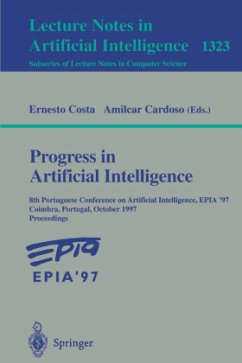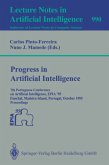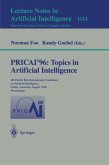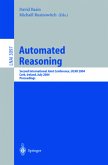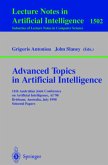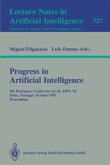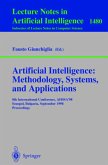Costa8th Portuguese Conference on Artificial Intelligence, EPIA '97, Coimbra, Portugal, October 6-9, 1997. Proceedings
Progress in Artificial Intelligence
8th Portuguese Conference on Artificial Intelligence, EPIA '97, Coimbra, Portugal, October 6-9, 1997. Proceedings
Mitarbeit:Costa, Ernesto; Cardoso, Amilcar
Costa8th Portuguese Conference on Artificial Intelligence, EPIA '97, Coimbra, Portugal, October 6-9, 1997. Proceedings
Progress in Artificial Intelligence
8th Portuguese Conference on Artificial Intelligence, EPIA '97, Coimbra, Portugal, October 6-9, 1997. Proceedings
Mitarbeit:Costa, Ernesto; Cardoso, Amilcar
- Broschiertes Buch
- Merkliste
- Auf die Merkliste
- Bewerten Bewerten
- Teilen
- Produkt teilen
- Produkterinnerung
- Produkterinnerung
This book constitutes the refereed proceedings of the 8th Portuguese Conference on Artificial Intelligence, EPIA '97, held in Coimbra, Portugal, in October 1997. The volume presents 24 revised full papers and 9 revised posters selected from 74 submissions from various countries. Also included are two full invited papers and two abstracts of invited talks. The papers are organized in topical sections on automated reasoning and theorem proving; CBR and machine learning; constraints; intelligent tutoring; knowledge representation; multi-agent systems and DAI; nonmonotonic, qualitative and temporal reasoning, and problem solving.…mehr
Andere Kunden interessierten sich auch für
![Progress in Artificial Intelligence Progress in Artificial Intelligence]() Pinto-FerreiraProgress in Artificial Intelligence41,99 €
Pinto-FerreiraProgress in Artificial Intelligence41,99 €![PRICAI '96: Topics in Artificial Intelligence PRICAI '96: Topics in Artificial Intelligence]() FooPRICAI '96: Topics in Artificial Intelligence81,99 €
FooPRICAI '96: Topics in Artificial Intelligence81,99 €![Automated Reasoning Automated Reasoning]() David Basin / Michael Rusinowitch (eds.)Automated Reasoning81,99 €
David Basin / Michael Rusinowitch (eds.)Automated Reasoning81,99 €![Advanced Topics in Artificial Intelligence Advanced Topics in Artificial Intelligence]() AntoniouAdvanced Topics in Artificial Intelligence41,99 €
AntoniouAdvanced Topics in Artificial Intelligence41,99 €![8th International Conference on Automated Deduction 8th International Conference on Automated Deduction]() 8th International Conference on Automated Deduction41,99 €
8th International Conference on Automated Deduction41,99 €![Progress in Artificial Intelligence Progress in Artificial Intelligence]() FilgueirasProgress in Artificial Intelligence41,99 €
FilgueirasProgress in Artificial Intelligence41,99 €![Artificial Intelligence: Methodology, Systems, and Applications Artificial Intelligence: Methodology, Systems, and Applications]() GiunchigliaArtificial Intelligence: Methodology, Systems, and Applications41,99 €
GiunchigliaArtificial Intelligence: Methodology, Systems, and Applications41,99 €-
-
-
This book constitutes the refereed proceedings of the 8th Portuguese Conference on Artificial Intelligence, EPIA '97, held in Coimbra, Portugal, in October 1997.
The volume presents 24 revised full papers and 9 revised posters selected from 74 submissions from various countries. Also included are two full invited papers and two abstracts of invited talks. The papers are organized in topical sections on automated reasoning and theorem proving; CBR and machine learning; constraints; intelligent tutoring; knowledge representation; multi-agent systems and DAI; nonmonotonic, qualitative and temporal reasoning, and problem solving.
Hinweis: Dieser Artikel kann nur an eine deutsche Lieferadresse ausgeliefert werden.
The volume presents 24 revised full papers and 9 revised posters selected from 74 submissions from various countries. Also included are two full invited papers and two abstracts of invited talks. The papers are organized in topical sections on automated reasoning and theorem proving; CBR and machine learning; constraints; intelligent tutoring; knowledge representation; multi-agent systems and DAI; nonmonotonic, qualitative and temporal reasoning, and problem solving.
Hinweis: Dieser Artikel kann nur an eine deutsche Lieferadresse ausgeliefert werden.
Produktdetails
- Produktdetails
- Lecture Notes in Computer Science 1323
- Verlag: Springer / Springer Berlin Heidelberg / Springer, Berlin
- Artikelnr. des Verlages: 10545743, 978-3-540-63586-4
- 1997.
- Seitenzahl: 420
- Erscheinungstermin: 19. September 1997
- Englisch
- Abmessung: 235mm x 155mm x 23mm
- Gewicht: 541g
- ISBN-13: 9783540635864
- ISBN-10: 3540635866
- Artikelnr.: 09236901
- Herstellerkennzeichnung Die Herstellerinformationen sind derzeit nicht verfügbar.
- Lecture Notes in Computer Science 1323
- Verlag: Springer / Springer Berlin Heidelberg / Springer, Berlin
- Artikelnr. des Verlages: 10545743, 978-3-540-63586-4
- 1997.
- Seitenzahl: 420
- Erscheinungstermin: 19. September 1997
- Englisch
- Abmessung: 235mm x 155mm x 23mm
- Gewicht: 541g
- ISBN-13: 9783540635864
- ISBN-10: 3540635866
- Artikelnr.: 09236901
- Herstellerkennzeichnung Die Herstellerinformationen sind derzeit nicht verfügbar.
Flexible proof-replay with heuristics.- Flexible re-enactment of proofs.- Inference rights for controlling search in generating theorem provers.- A retrieval method for exploration of a case memory.- Incremental concept evolution based on adaptive feature weighting.- A 0-1 quadratic knapsack problem for modelizing and solving the constraint satisfaction problems.- An algorithm for solving systems of linear diophantine equations in naturals.- GenSAT: A navigational approach.- Timetabling using demand profiles.- Intelligent VR training.- Training strategies and knowledge acquisition: Using the same reflective tools for different purposes.- About the intended meaning of a linguistic negation.- Integration of inheritance in SNePS.- Measures of uncertainty and independence concept in different calculi.- A Multi-agent approach to first-order logic.- Modelling dynamic aspects of intentions.- Multi-agent negotiation algorithms for resources cost estimation: A case study.- Parla: A cooperation language for cognitive multi-agent systems.- Vivid agents arguing about distributed extended logic programs.- Approximate reasoning.- New results about sub-admissibility for general families of heuristic search algorithms.- Fixed point classification method for qualitative simulation.- Contextual logic of change and the ramification problem.- Temporal reasoning about actor programs.- A CLP model to the job sequencing problem.- A new approach for extracting rules from a trained neural network.- Bayesian networks, rule induction and logistic regression in the prediction of women survival suffering from breast cancer.- Controlling for unexpected goals when planning in a mixed-initiative setting.- Cooperative memory structures and commonsense knowledge for planning.- Diagonalization and typerewriting in clam.- Granularity for explanation.- Object model of intelligent tutoring shell.- Resource allocation on agent meta-societies.- Diagnostic information at your fingertips!.- Reasoning about actions with abductive logic programming.- Dimensions of embodiments: Possible futures for cognitive science (Abstract).- Machine learning meets natural language (Abstract).
Flexible proof-replay with heuristics.- Flexible re-enactment of proofs.- Inference rights for controlling search in generating theorem provers.- A retrieval method for exploration of a case memory.- Incremental concept evolution based on adaptive feature weighting.- A 0-1 quadratic knapsack problem for modelizing and solving the constraint satisfaction problems.- An algorithm for solving systems of linear diophantine equations in naturals.- GenSAT: A navigational approach.- Timetabling using demand profiles.- Intelligent VR training.- Training strategies and knowledge acquisition: Using the same reflective tools for different purposes.- About the intended meaning of a linguistic negation.- Integration of inheritance in SNePS.- Measures of uncertainty and independence concept in different calculi.- A Multi-agent approach to first-order logic.- Modelling dynamic aspects of intentions.- Multi-agent negotiation algorithms for resources cost estimation: A case study.- Parla: A cooperation language for cognitive multi-agent systems.- Vivid agents arguing about distributed extended logic programs.- Approximate reasoning.- New results about sub-admissibility for general families of heuristic search algorithms.- Fixed point classification method for qualitative simulation.- Contextual logic of change and the ramification problem.- Temporal reasoning about actor programs.- A CLP model to the job sequencing problem.- A new approach for extracting rules from a trained neural network.- Bayesian networks, rule induction and logistic regression in the prediction of women survival suffering from breast cancer.- Controlling for unexpected goals when planning in a mixed-initiative setting.- Cooperative memory structures and commonsense knowledge for planning.- Diagonalization and typerewriting in clam.- Granularity for explanation.- Object model of intelligent tutoring shell.- Resource allocation on agent meta-societies.- Diagnostic information at your fingertips!.- Reasoning about actions with abductive logic programming.- Dimensions of embodiments: Possible futures for cognitive science (Abstract).- Machine learning meets natural language (Abstract).

